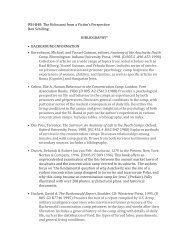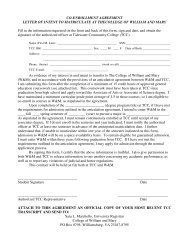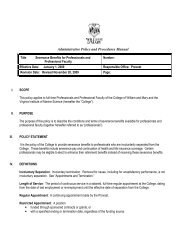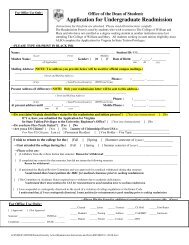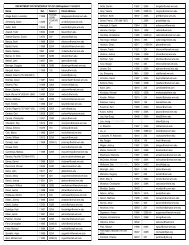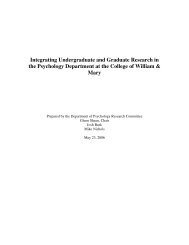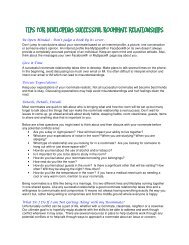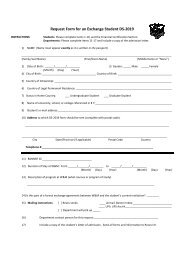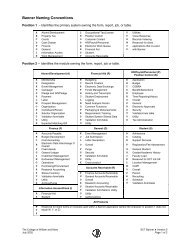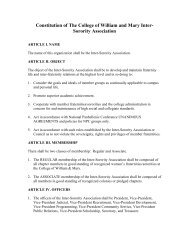Course Selection Guidebook [pdf] - College of William and Mary
Course Selection Guidebook [pdf] - College of William and Mary
Course Selection Guidebook [pdf] - College of William and Mary
Create successful ePaper yourself
Turn your PDF publications into a flip-book with our unique Google optimized e-Paper software.
<strong>Course</strong> <strong>Selection</strong> <strong>Guidebook</strong> – Fall 2011203. History <strong>and</strong> Religion <strong>of</strong> Ancient Israel - (GER 4B, 5) Fall <strong>and</strong> Spring (3) A study <strong>of</strong> thehistory <strong>and</strong> traditions <strong>of</strong> ancient Israel, with emphasis upon the setting, transmission, context, <strong>and</strong>theological self-underst<strong>and</strong>ing reflected in biblical texts.204. Christian Origins - (GER 4A, 5) Fall <strong>and</strong> Spring (3) A study <strong>of</strong> the origin <strong>and</strong> development <strong>of</strong>earliest Christianity. The course focuses on the New Testament <strong>and</strong> other ancient documents withattention to the Greco-Roman historical contexts <strong>of</strong> the emerging Christian faith.210. Introduction to the History <strong>of</strong> Christianity - (GER 4A) Fall <strong>and</strong> Spring (3) An introduction toWestern Christianity that focuses upon selected periods, critically important movements <strong>and</strong>events, theological developments <strong>and</strong> institutional changes, with attention to the relationshipbetween Christianity <strong>and</strong> currents in the wider culture.211. Introduction to the History <strong>of</strong> Jewish Thought - (GER 4A, 5) Fall (3) A study <strong>of</strong> the biblicalorigins <strong>of</strong> Judaism followed by an examination <strong>of</strong> representative literature from critical periods inthe history <strong>of</strong> Jewish thought: rabbinic, medieval, <strong>and</strong> modern.212. Introduction to Islam - (GER 4B) Fall <strong>and</strong> Spring (3) A study <strong>of</strong> the origins, major ideas,practices, institutions, <strong>and</strong> development <strong>of</strong> Islam within the context <strong>of</strong> Muslim history.213. Introduction to Hinduism – (GER 4B) Fall <strong>and</strong> Spring (3) A study <strong>of</strong> major developments<strong>and</strong> principles <strong>of</strong> Hinduism, beginning with Vedic period. Topics include: The changingconceptions <strong>of</strong> sacrifice; the inquiries into the nature <strong>of</strong> the self; the nature <strong>of</strong> the Ultimate; the role<strong>and</strong> development <strong>of</strong> devotion; mythology; ritual <strong>and</strong> its functions; the influence <strong>of</strong> Buddhism <strong>and</strong>Islam; <strong>and</strong> the character <strong>of</strong> Hinduism in modern India.214. Introduction to Buddhism – (GER 4B) Fall (3) A study <strong>of</strong> the history, doctrines, practices,<strong>and</strong> various manifestations <strong>of</strong> the Buddhist tradition. The course begins with the social <strong>and</strong>religious context out <strong>of</strong> which the Buddha emerged, progresses to an exploration <strong>of</strong> Buddhism’sphilosophical basis, <strong>and</strong> traces the spread <strong>of</strong> Buddhism from India <strong>and</strong> its later developments inNepal <strong>and</strong> Tibet, Southeast Asia, <strong>and</strong> China <strong>and</strong> Japan.215. History <strong>of</strong> Religion in East Asia - (GER 4B) Spring (3) Introduction to the religious systems<strong>of</strong> China <strong>and</strong> Japan, including the literatures, histories, thought patterns <strong>and</strong> practices <strong>of</strong> the majorschools <strong>of</strong> Confucianism, Taoism, Buddhism <strong>and</strong> Shintoism.221. Religion <strong>and</strong> Ethics - (GER 7) Fall <strong>and</strong> Spring (3) An introductory study <strong>of</strong> western religiousethics. The course closely examines the relationships between religious belief <strong>and</strong> ethics inbiblical, Jewish, Roman Catholic, Protestant, <strong>and</strong> humanistic writings. The course emphasizesanalytic <strong>and</strong> critical thinking skills.SociologyThe Sociology Department provides both prepr<strong>of</strong>essional training in Sociology <strong>and</strong> a sound liberalarts background for careers in public services <strong>and</strong> administration, law, business, medicine,journalism, <strong>and</strong> the other pr<strong>of</strong>essions. The Sociology curriculum covers a variety <strong>of</strong> topics <strong>and</strong>issues, but all <strong>of</strong> our courses deal with the nature <strong>and</strong> consequences <strong>of</strong> human social arrangements.73


![Course Selection Guidebook [pdf] - College of William and Mary](https://img.yumpu.com/46952524/73/500x640/course-selection-guidebook-pdf-college-of-william-and-mary.jpg)
